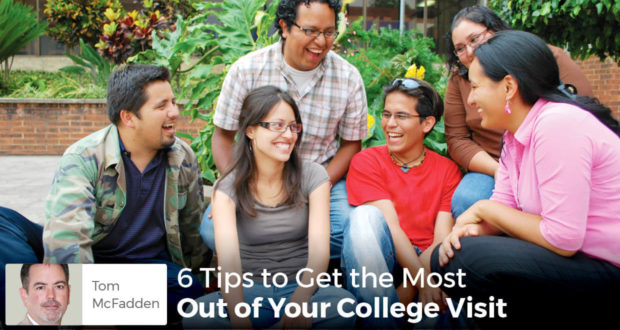Summary
After helping thousands of students and their families get the most from a college visit, Vice President of Enrollment Tom McFadden has valuable advice for you.Choosing the right college can be a very daunting, and sometimes overwhelming, task.
There are so many ways to find out about your favorite schools, but I must say the best way to get a good feel for the place you want to call home for the next four years is to make a campus visit. The college visit can be the determining factor in a family’s decision making process.
Travelling to several colleges can get expensive and time-consuming, so if you don’t know what you should be finding out while visiting the college, it could all be in vain.
Working in Christendom College’s admissions office for the past 12 years and meeting with thousands of students and their families during their visits, I think I can safely give good advice on how to make the most of your campus visit.
Here are 6 tips to getting the most out of your time spent on campus.
1. Prepare well – do your homework
Colleges spend a lot of time and money keeping their websites and glossy brochures up to date. They understand their future customers will spend tremendous time reviewing all their information, and they hope to make a good “first impression” on the viewer. So, review the basics, which might include cost to attend, faithfulness to Catholicism, programs of study and majors, student life residential policies, what alumni do post-graduation, extra-curricular activities, and sports offered, and other such things.
You can get most of these “facts” from the college’s website, and I recommend taking notes on some things you come across about which you’d like more information. Make your three lists, as I’ve written about before (what you want in a college, what you don’t want in a college, and what might be nice to have in a college experience) and then make your travel arrangements.
2. Plan questions before your arrival.
If you are meeting with the Admissions Director or an Admissions Counselor, ask big picture questions. Some examples might be:
- What makes this college different than this other college I am considering?
- What types of students succeed here?
- Are there any things I should do right now that would improve my chances of being accepted and gaining better financial aid or scholarship packages?
- Can you tell me about the amount of personal interactions students have with professors outside of class?
If you are given a student tour guide, ask questions from their perspective, like:
- What other colleges did you look at before choosing this one? Why did you choose this one?
- What do you do for fun on campus? What groups or clubs are you involved with?
- What are things you are not-so-happy with here? Are there things you thought would have been offered or happen but have not?
- Are you happy you chose this school, and what are your hopes and aspirations for post-graduation life? Is this college experience helping you achieve those goals?
3. People Watch
Don’t be a stalker, but it is very important to look around and see what other students are doing, how they are behaving, what they are talking about, how they interact with other students and faculty. Are these the type of people you want to spend four years with? Do you want to become friends with these types of people? Do they have your same values, your same interests, your same goals, and aspirations?
These are important questions to ask if you are going to get the most from your visit.
4. Go to Liturgical Celebrations
The liturgical life of a college can affect you deeply. Some Catholics prefer one type of liturgical setting over another, and it is important to find out if the college you are visiting has what you are looking for to meet your spiritual needs.
Also, see if anyone goes to daily Mass or whether confessions are heard regularly. And listening to the music at Mass or the priest’s homily can sometimes be beneficial to see if it all fits into what you are used to in your spiritual life.
Remember, spiritual life is not something additional or extra-curricular to your life, or at least, it should not be. It is an essential element needed to help you achieve your goal of being holy and gaining eternal life – let no college environment, or its lack of liturgical offerings, lead you off the narrow road.
5. Spend time in the residence halls with students
You can tell a lot about a college and its student body by what happens once the lights go out, so to speak. Once classes are over, and all the professors and staff have gone home for the day, what do the students do with their free time? Are things going on in the dormitory that offend you? Are people watching or listening to media in which you would rather not partake?
Are there people of the opposite sex wandering about in your dorm? Is the place quiet enough to study and sleep? What do the students talk about in their free time, or maybe they don’t talk, but are plugged into their electronic devices? When you go to college, you only spend about 18-20 hours a week in class.
It’s important to know how students use their free time, and whether they use it well because you will be immersed in the same lifestyles as they are. Understand their lifestyles and the dorm life of that campus before signing on the bottom line.
6. Sit in on classes
You are interested in going to a college, so the academic life is at the center of your decision. It is very important to sit in on classes to see if the teaching styles and classroom set-ups are to your liking. Are the classrooms huge, with 300 students, or are they small and intimate with 20 students? Do the students seem attentive and engaged in class, or are they snoozing or playing video games on their laptops? Is the professor animated, knowledgeable, and engaging?
Does he appear to love his teaching position, or does it seem like he’s simply reading his notes, waiting for the bell to ring so that he can get back to his research project? Is the teacher just a graduate student, not a full-fledged professor? Does he know people by names, or are his students just numbers in a crowd? Is the subject taught from a particular point of view – Catholic, secular, anti-Catholic, liberal, conservative, etc.?
A college visit should give you a good perspective of what the campus life is like, and you should be able to leave with a much better understanding of whether you would fit into this or that college and connect well with a particular student body.
I highly recommend visiting a campus early in your college search, either by attending a pre-college summer program, like the one we offer at Christendom College, by making a regular day/night visit, or by attending a college’s Open House event. And it’s fine to make a second visit if necessary.
Those of us who work in college admissions offices understand and welcome your presence on our campus – no matter how often that may be.

 Seton Magazine Catholic Homeschool Articles, Advice & Resources
Seton Magazine Catholic Homeschool Articles, Advice & Resources

